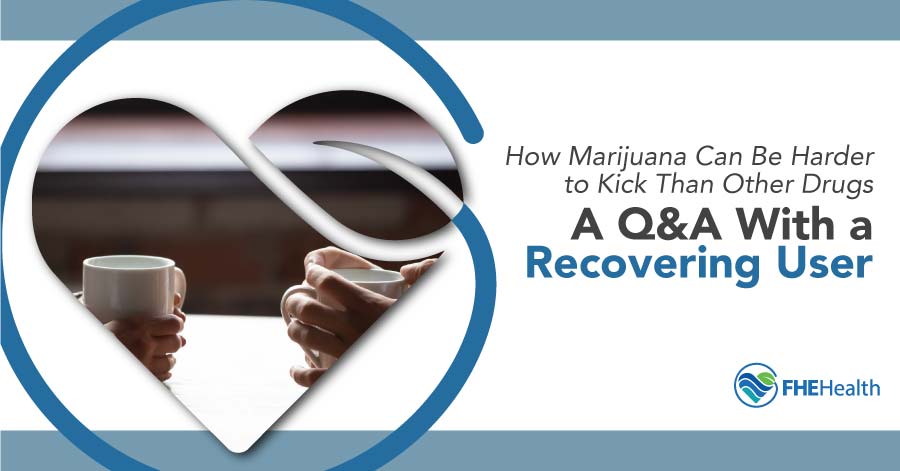
Roughly 30 percent of people who use marijuana have some degree of a marijuana use disorder, according to a report by the National Institute on Drug Abuse. Yet most Americans probably don’t know that, thanks to this country’s new and growing love affair with pot. As the number of states legalizing medical and recreational marijuana has grown in recent years, so, too, has the notion that marijuana isn’t just harmless but is “natural” and even good for you.
Does this prevailing public view that pot is harmless make it harder for those who are addicted to admit they have a problem? We put this question and others before one recovering pot user, a young man whom we’ll call “John.” Before marijuana took over his life, John was a sought-after baseball player with a very real shot at going pro. Within a short time, though, John’s addiction to weed became the primary passion in his life. It eventually led him to experiment with other drugs— and, even when he had successfully kicked the other drugs, John could not kick his marijuana habit.
Today, after successfully giving up pot with the help of treatment, John is happily employed in a successful, full-time job and a semi-pro baseball player in his free time. In a recent interview, he shared why marijuana proved harder to quit than other drugs and addressed the unique challenges to recovery that marijuana poses and how to overcome them….
How Smoking Weed Can Become an Addiction
Q: Was there a time when you went from using multiple illicit substances to only using marijuana, and if so, how did that happen?
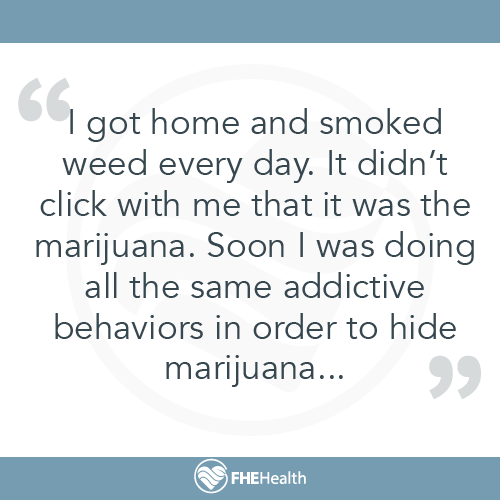 A: After that initial recovery, I was back on the run with every drug I was using. I went to North Carolina, where I decided I was going to get clean and live up there. I went to treatment there but it didn’t work, and at this point decided I was going to strictly use marijuana. I figured that if I just smoked weed I’d be fine.
A: After that initial recovery, I was back on the run with every drug I was using. I went to North Carolina, where I decided I was going to get clean and live up there. I went to treatment there but it didn’t work, and at this point decided I was going to strictly use marijuana. I figured that if I just smoked weed I’d be fine.
At this point [in early sobriety following treatment for cocaine], I thought I’d been sober for a while— it had been about six months—and that’s when I noticed that I no longer called my sponsor… I was in a fog. I got home and smoked weed every day. It didn’t click with me that it was the marijuana. Soon I was doing all the same addictive behaviors in order to hide marijuana and found a new group that led me down the path I was on before… soon I was homeless and at this point decided I need to fix this or die.
Q: If I had been in your shoes at that time, during a relapse, my rationale for smoking weed would have been that compared to the other drugs I had been doing, pot would be pretty harmless… Was that your rationale?
A: That’s exactly right.
Marijuana for Anxiety, Depression and Other Mental Health Conditions?
Q: I know someone who smokes pot for his depression and I’m wondering how common that sort of thing is. From your experience, do a lot of people smoke pot to self-medicate symptoms? Was that true for you?
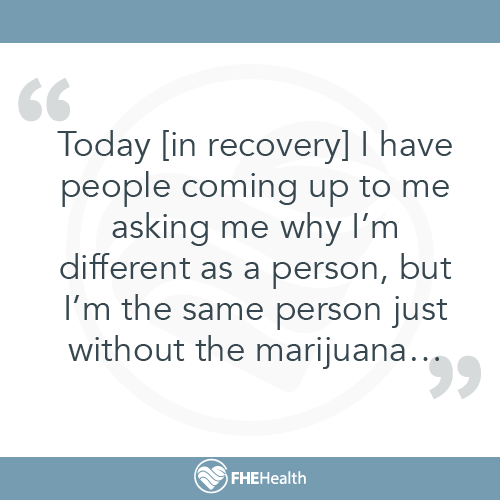 A: In my case, no. If anything, it caused depression. (But self-medicating is common because they try to tell you that [pot] is natural to make it socially acceptable.) From my experience, I was not taking it for depression, and when I started taking it those depressive symptoms came back. (And people kept telling me that the pot was causing my depression and I’d say, “No, it’s the other drugs.”) I didn’t want to get up before noon. There were things that I started to do when I was depressed and those things started to come up. When I was sober, I hadn’t slept past 9am … when I was using pot, there just wasn’t any reason to get out of bed. Everything, the ups and the downs, were numbed. It literally caused my depression.
A: In my case, no. If anything, it caused depression. (But self-medicating is common because they try to tell you that [pot] is natural to make it socially acceptable.) From my experience, I was not taking it for depression, and when I started taking it those depressive symptoms came back. (And people kept telling me that the pot was causing my depression and I’d say, “No, it’s the other drugs.”) I didn’t want to get up before noon. There were things that I started to do when I was depressed and those things started to come up. When I was sober, I hadn’t slept past 9am … when I was using pot, there just wasn’t any reason to get out of bed. Everything, the ups and the downs, were numbed. It literally caused my depression.
Today [in recovery] I have people coming up to me asking me why I’m different as a person, but I’m the same person just without the marijuana … and I try to tell them that the depression, the anxiety, the stresses come from using pot … that anxiety doesn’t come from your job— it’s from the weed. I was anxious and paranoid (in the sense that things were wrong that didn’t need to be wrong). And, I noticed the only thing that made me that way was, strictly speaking, smoking weed.
But people who self-medicate have all sorts of reasons. The reason I drank was because I was sad, and the reason I took Percocet was because my back hurt. I’ve had doctors tell me I should smoke marijuana for my headaches, but I know that from smoking weed I wake up with a headache … If you’re smoking weed because your arm hurts, it has no medical effect on how much your arm hurts. All these reasons you’re given to smoke it are the same reasons I gave myself to smoke it. Every drug I used I self-medicated with: There was a reason I used it, and we can use the “self-medicating” claim as an excuse … in the case of marijuana, THC is the chemical in weed that gets you high and produces a euphoric effect; and from what I know THC has no medical purpose. That psychedelic factor that gets you high has no medical purpose.
How Pot Can Lead to an Unhealthy Lifestyle – When to Know It’s a Problem
Q: When did you know marijuana was the problem? What were the signs?
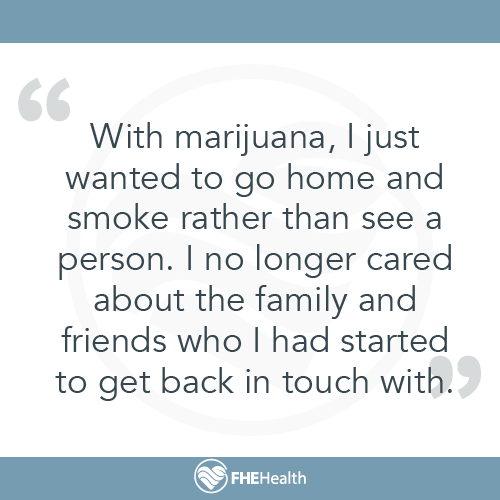 A: I had been an avid drug user prior to getting into pot … It’s just something that you start to see … what it does to you— your overall work ethic is completely gone. Getting back into smoking marijuana the results were so much stronger than I could even have known.
A: I had been an avid drug user prior to getting into pot … It’s just something that you start to see … what it does to you— your overall work ethic is completely gone. Getting back into smoking marijuana the results were so much stronger than I could even have known.
Just the first couple of days into it, I noticed that all the days that I had built up in my career and the things I was trying to maintain on a daily basis in order to live these daily habits—in order to live a healthy recovery lifestyle—all of those things were gone in a matter of days … All my ambitions to go to the gym, to go to work … With marijuana, I just wanted to go home and smoke rather than see a person. I no longer cared about the family and friends who I had started to get back in touch with. I noticed those types of behavioral changes within less than a week of starting to smoke and was sober enough at the time to notice these changes and put the pot down.
Positive Incentives to Quit Smoking Weed
Q: What, if anything, happened when you quit smoking weed?
Rather quickly, without the use of drugs, those ambitions started to reappear. If I had continued to smoke weed for a long period of time those connections would be gone. I could see myself secluding from the world, and it was scary. The people I was around could no longer know that I was smoking weed and in order to hide it, that effort itself put a strain on me physically, emotionally … All of that fear [associated with active addiction] came right back: the financial insecurity of not being able to have that weed the next day, etc…
Fear and Embarrassment Common Obstacles to Getting Help for a Marijuana Problem
Q: Based on your experience, would you say a lot of people have marijuana problems but are afraid to say so?
A: More than you know. I meet people a lot of the time who will ask me, “I see you’re happy now and are doing OK. What are you doing that’s different? You’re genuinely OK with life.” I work the same job and I live in the same house. It’s my overall outlook that has changed. Now two years clean, I realize that no matter what I do, anything that does not revolve around my current circle of sobriety is going to lead me back to where I was … Any old behaviors—the lying, complacency, negative behaviors that you used to do—it’s going to lead you back to where you were….
Q: When did you seek treatment?
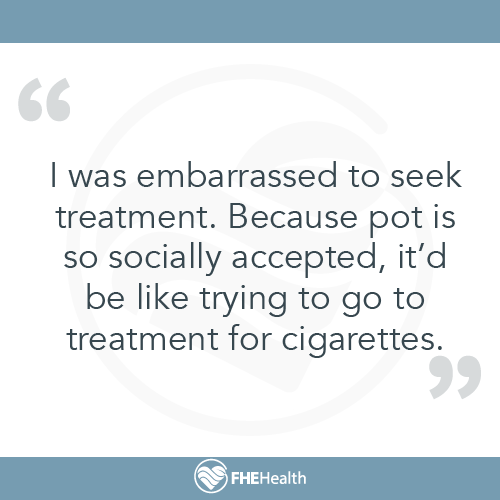 A: I was embarrassed to seek treatment. Because pot is so socially accepted, it’d be like trying to go to treatment for cigarettes. It was like everybody did it and they’d laugh at you; but that view is basing itself on what marijuana was in 1980 (4 percent THC); and today marijuana is upwards of 25-35 percent THC— and, can get upwards of 95 percent THC. It’s genetically modified THC extraction, not the user-friendly, medicinal, earthy marijuana that people still remember this as… This is a whole different caliber of drug we’re dealing with.
A: I was embarrassed to seek treatment. Because pot is so socially accepted, it’d be like trying to go to treatment for cigarettes. It was like everybody did it and they’d laugh at you; but that view is basing itself on what marijuana was in 1980 (4 percent THC); and today marijuana is upwards of 25-35 percent THC— and, can get upwards of 95 percent THC. It’s genetically modified THC extraction, not the user-friendly, medicinal, earthy marijuana that people still remember this as… This is a whole different caliber of drug we’re dealing with.
With the marijuana itself, the second time around I knew that the marijuana was exactly what led me back to where I was. That was what I started and it led me right back to where I was and right back to treatment. I got sober the third time that I went to treatment [for marijuana]. At that point, I knew that if a “soft-core” drug-like weed can take me down, I need help.
Why Is It So Hard to Quit Smoking Weed?
Q: By definition, if you’re suffering from an addiction to a substance, then it’s going to be hard to quit that substance. But would you say there were some unique aspects of marijuana that made it hard for you to quit?
A: The social acceptability of it and that everyone is ok with it— that makes it so easy to use… The accessibility: It is anywhere and everywhere; it’s so easy to come by… You see weddings today where the bride and groom are smoking bongs rather than toasting champagne.
Help for Anyone Who Wants to Quit Smoking Weed
Q: What tips would you offer someone who is afraid to ask for help for a pot addiction because of fear of what people might think?
A: Don’t worry about it. It’s your life. If you think you need help, there’s a reason you’re having those thoughts, and there’s not a person in the treatment center who is going to think less of you for that. If there’s an addiction that’s affecting your life, there are places for people who truly suffer. There’s no shame in going to treatment and getting on the path to recovery. There’s not a person who thinks less of me, but there are a lot of people who think more of me for it. I also want anyone who’s suffering from an addiction to weed to know they’re not alone in going through this and that there are help and hope for healing.
Are you having trouble kicking a marijuana habit? Don’t suffer another day thinking you’re alone. Learn how FHE Health can help.






